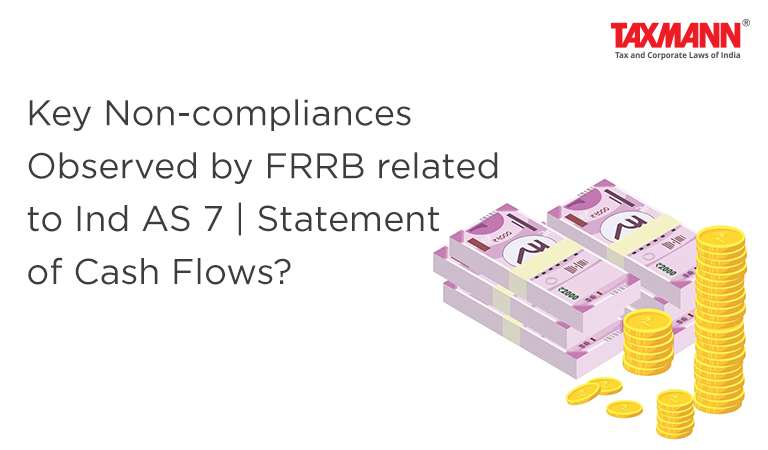Key Non-compliances Observed by FRRB related to Ind AS 7 | Statement of Cash Flows
- Blog|News|Account & Audit|
- 2 Min Read
- By Taxmann
- |
- Last Updated on 4 April, 2023
 The Financial Reporting Review Board (FRRB) of ICAI conducts a review of general purpose financial statements of various enterprises for compliance with generally accepted accounting principles (GAAP), compliance with the reporting obligations of the auditor and compliance with disclosure requirements prescribed by regulatory bodies, statutes and rules and regulations relevant to the enterprise. FRRB was constituted as a proactive mechanism to improve financial reporting practices. This story will take a closer look at some of the key non-compliances and errors observed by the FRRB in relation to the Ind AS 7, Statement of Cash Flows.
The Financial Reporting Review Board (FRRB) of ICAI conducts a review of general purpose financial statements of various enterprises for compliance with generally accepted accounting principles (GAAP), compliance with the reporting obligations of the auditor and compliance with disclosure requirements prescribed by regulatory bodies, statutes and rules and regulations relevant to the enterprise. FRRB was constituted as a proactive mechanism to improve financial reporting practices. This story will take a closer look at some of the key non-compliances and errors observed by the FRRB in relation to the Ind AS 7, Statement of Cash Flows.
I. Relevant Provision: Para 20 of Ind AS 7, Statement of Cash Flows, states as follows:
Under the indirect method, the net cash flow from operating activities is determined by adjusting profit or loss for the effects of:
a) changes during the period in inventories and operating receivables and payables
b) non-cash items such as depreciation, provisions, deferred taxes, unrealized foreign currency gains and losses, and undistributed profits of associates
c) all other items for which the cash effects are investing or financing cash flows
Alternatively, the net cash flow from operating activities may be presented under the indirect method by showing the revenues and expenses disclosed in the statement of profit and loss and the changes during the period in inventories and operating receivables and payables.
II. Disclosure under Cash flow statement: The net profit before tax was used to derive cash flow from operating activities. The re-measurement of the defined benefit plan was deducted under ‘Other Comprehensive Income’.
III. Board Observation: Since the re-measurement of the defined benefit plan is a part of OCI, it should not be adjusted to the net profit before tax while calculating the cash flow from operating activities.
This story further discusses key observations of the Review Board on an increase in trade receivables, gratuity in other comprehensive income, capital expenditure, repayment of external commercial borrowings, and taxes on income in relation to Ind AS 7, Cash flow Statement, in a tabular manner.
Click Here To Read The Full Story
Disclaimer: The content/information published on the website is only for general information of the user and shall not be construed as legal advice. While the Taxmann has exercised reasonable efforts to ensure the veracity of information/content published, Taxmann shall be under no liability in any manner whatsoever for incorrect information, if any.

Taxmann Publications has a dedicated in-house Research & Editorial Team. This team consists of a team of Chartered Accountants, Company Secretaries, and Lawyers. This team works under the guidance and supervision of editor-in-chief Mr Rakesh Bhargava.
The Research and Editorial Team is responsible for developing reliable and accurate content for the readers. The team follows the six-sigma approach to achieve the benchmark of zero error in its publications and research platforms. The team ensures that the following publication guidelines are thoroughly followed while developing the content:
- The statutory material is obtained only from the authorized and reliable sources
- All the latest developments in the judicial and legislative fields are covered
- Prepare the analytical write-ups on current, controversial, and important issues to help the readers to understand the concept and its implications
- Every content published by Taxmann is complete, accurate and lucid
- All evidence-based statements are supported with proper reference to Section, Circular No., Notification No. or citations
- The golden rules of grammar, style and consistency are thoroughly followed
- Font and size that’s easy to read and remain consistent across all imprint and digital publications are applied



 CA | CS | CMA
CA | CS | CMA
